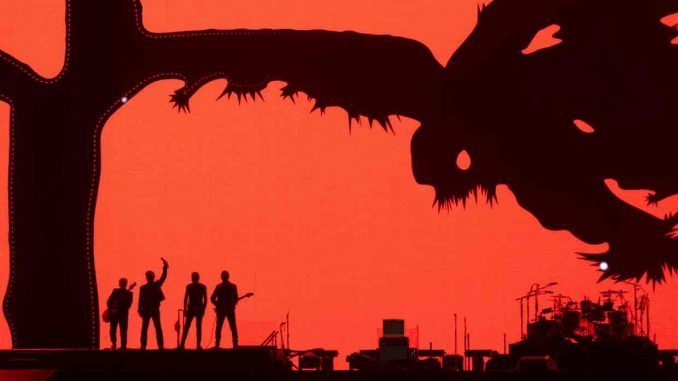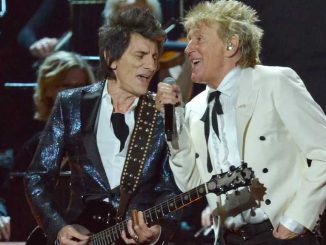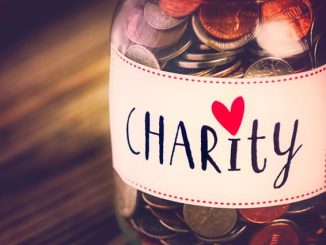
From the Guardian
Touring Trump’s America with their newly resonant 1987 album is either the grand act that makes U2 great again, or a tacit admission of creative decline

It’s the opening night of U2’s Joshua Tree 2017 world tour, and Bono is gamely “trying to find some magic in the concrete temple” of Vancouver’s BC Place stadium. It takes him longer than you might expect: the five-song warm-up set that leads into The Joshua Tree itself betrays some first-night rustiness, and there are moments when the diminutive frontman with the elephantine ego seems uncharacteristically subdued, uneasy, even a little insecure. “Was that all right?” he asks the crowd as he leaves the stage two hours later, seemingly unsure of what sort of answer he’ll get in response.
There are good reasons for that uncertainty, reasons that might go some way to explaining why a band who always prided themselves on evolution and reinvention have suddenly decided to gaze into the middle-distance of their own history. Classic-album tours have become commonplace in recent years, but while the financial rewards are plentiful, they’re also a tacit admission that your audience is less invested in your future than your past – anathema for a group like U2, who have always conflated being the biggest band in the world with being the best.
It was on The Joshua Tree that they first grasped that mantle, but 30 years later, they’re struggling to figure out what size amounts to in an industry that’s changed beyond all recognition. The Joshua Tree sold 25m copies in a pre-digital age and is by any measure one of the most popular albums of all time; their most recent effort, 2014’s Songs of Innocence, was thrust on to 500m iTunes accounts as part of an ill-judged publicity stunt, and is merely one of the most pervasive. As a touring band, U2 still have a licence to print money, but as a creative force, a question mark continues to hang over them.
The Edge has cited the Trump effect as one reason for revisiting The Joshua Tree, pointing out that the album, “was written in the mid-80s, during the Reagan-Thatcher era of British and US politics. It was a period when there was a lot of unrest. Thatcher was in the throes of trying to put down the miners’ strike; there was all kinds of shenanigans going on in Central America. It feels like we’re right back there, in a way. I don’t think any of our work has ever come full circle to that extent.”
If that’s the case, you could argue that 1993’s Zooropa provides more fertile thematic ground to explore the fake news, demagoguery and data analytics that actually swept Trump to power, but that iteration of the band is neither as beloved nor as iconic as The Joshua Tree’s outsider’s-eye-view of America’s shared symbols, history and heritage (it also sold 18m fewer copies). No, if the idea is to make U2 great again, to restore them to their former capacity as rock’s great mediators in an age of hyper-partisanship and polarisation, it could only be The Joshua Tree.
Read more here
Why not explore the vast amount of U2 vinyl, CDs, memorabilia and more currently in stock at eil.com – new items added daily.




Be the first to comment